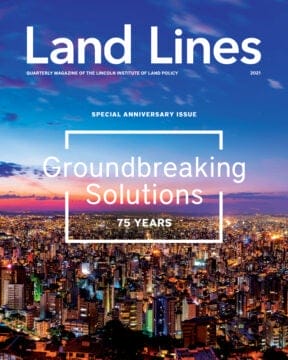Celebrating 75 Years: 1946 to 2021
It began with a simple but powerful idea, championed by the political economist Henry George at the dawn of the Gilded Age: by freeing communities from land speculation, governments can unlock opportunities that enable everyone to thrive.
A generation later, John Cromwell Lincoln turned the idea into a living legacy and created what would become the Lincoln Institute of Land Policy. After more than 75 years, at a time when gaping inequality persists, our founding ideals have never been more relevant.
Watch the “Life of an Idea” video to see the groundbreaking solutions the Lincoln Institute has advanced over the past 75 years and what we are looking toward in the decades to come.
Life of an Idea
Cleveland industrialist and inventor John C. Lincoln established the Lincoln Foundation in 1946 to advance the economic theories of Henry George. Both men believed in the power of land policy to create a more equitable society. Building on his father’s vision and initial success in the United States, David C. Lincoln later grew the organization internationally to explore how land policy could help solve problems in differing political and economic contexts. His daughter, Kathryn J. Lincoln, took the helm as chair of the board in 1996. Under her guidance and global vision, the board has expanded the institute’s reach and impact to address urgent challenges such as climate change. Operating first as a small foundation and later as a school, the Lincoln Institute of Land Policy now performs public policy research, education, and consulting on six continents. The Lincoln Institute carries forward John C. Lincoln’s vision in innovative and evolving ways to find answers in land.
The Lincoln Institute’s history and evolution is presented in this interactive timeline.

Land Lines Anniversary Edition
The double issue of Land Lines commemorates the 75th anniversary, chronicling the organization’s history and exploring how land can help solve social, economic, and environmental challenges around the globe. From rural villagers in China to tribal nations along the Colorado River, we take a closer look at the people and places finding answers in land.
Event Recordings
Investing in Change(makers): Equitably Developing America’s Small and Mid-Sized Legacy Cities
May 26, 2021
Tackling Climate Change: The Not-So-Hidden Role of Land
June 23, 2021
On the Waterfront: Connecting Neighborhoods to the Shore
July 30, 2021
Lessons from the Colorado River: Climate, Land, and Drought
September 8, 2021
